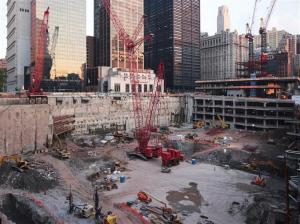Will Silverstein W.T.C. Deal Be Done by 9/11 Anniversary?
By Eliot Brown August 24, 2010 8:44 pm
reprints Back in March, after more than a year of stalemate, fighting and negotiating, a deal was struck between the Bloomberg administration, the Paterson administration, the Port Authority and developer Larry Silverstein on a path forward for two office towers on the World Trade Center site.
Back in March, after more than a year of stalemate, fighting and negotiating, a deal was struck between the Bloomberg administration, the Paterson administration, the Port Authority and developer Larry Silverstein on a path forward for two office towers on the World Trade Center site.
The city, state and Port Authority would each put in $200 million, plus rent abatements and other benefits, toward one of Mr. Silverstein’s towers—3 W.T.C.—and Mr. Silverstein would continue with work on his portion of the site, per the terms of the deal announced at the time. All of this, however, was tentative, contingent on the Port Authority, Silverstein Properties and the other parties inking a final deal, a task they gave themselves 120 days to do.
That 120-day window closed without much notice in late July, and now, four weeks later, the deal has run into some difficulties at the Port Authority. Presented last week with a term sheet (agreed to by all the other parties), multiple commissioners on the bi-state agency’s board have signaled numerous concerns with the deal, according to multiple people familiar with discussions. The reaction has troubled Port Authority officials and others involved in the deal, with many worrying that a finished deal could now take weeks to complete given the board’s concerns, or, if talks go poorly, the deal could be imperiled.
All of this comes with a few ticking clocks for the Port Authority and Silverstein. Foremost from the perspective of public perception is a large press event scheduled for Sept. 7 at Mr. Silverstein’s 7 World Trade Center. The event is an annual affair meant to show off progress on the site, and local officials frequently attend and give speeches (the mayor and governor might come this year). If a deal is not completed by then, it would clearly be a black eye for the Port Authority and others involved.
Then there is a more practical reason: Mr. Silverstein has been readying a sale this fall of his tax-exempt liberty bonds to finance the construction of Tower 4. Without the bonds, construction could be interrupted; and the firm cannot sell the bonds until a deal is inked.
The Bloomberg administration has been pushing the Port Authority as well, a city official said, with the expectation that the agency will vote well before Sept. 11.
Among other issues, some on the board have concerns with the plan to give Mr. Silverstein development fees during construction (the board had wanted to see all of his fees, which amount to tens of millions of dollars, captured and inaccessible to Mr. Silverstein until the agency is paid back). There are also concerns about the nature of the $300 million that Mr. Silverstein must raise and put into Tower 3 in order for the government to put in its subsidy on the building.
Of course, discord between the Port Authority board and staff could easily amount to a small bump in the road. The agency has a long history of friction between its board and its staff—its bi-state structure lends itself to this—and such back and forth is not unusual on large deals. Further, the board has only seem the term sheet for a few days, so this simply could end up proving a small obstacle on the road to a completed deal.
With that said, the board has been particularly active on this deal, and in March it refused to sign off on a much less detailed term sheet, opting to wait until the final deal is reached. Some of this friction was revealed in a letter from commissioner Henry Silverman to the rest of the board—The Times wrote about this then—that outlined a number of demands, including an insistence that Mr. Silverstein not take development fees until the public is paid back.



